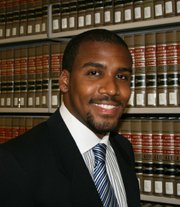I have always been taught, even as a young, frail kid, to always ask "why?" Why did Michael Jackson look like a black kid in the 1970s but like a white woman in the '90s, or why do people commit to war rather than peace? At age 8, I asked my father why I stuttered so much and how can I stop it so people would stop making fun of me. By age 10, I asked my mother why I was taller than she was.
The simple questions were generally answered with ease, while the more complex usually went unanswered, or someone simply made up an answer to curb my hunger for knowledge and understanding. My parents knew I would not simply be satisfied with "well, that's just the way it is."
To this day, I still attempt to follow the "Why" doctrine. Take the tragic death of teenager Michael Brown. The "Why" doctrine allows us to ask why a police officer gunned down this unarmed young, black male with no justification, with officers then leaving him dead in his own pool of blood for more than four hours. A certain faction of America views the young, black male as an inferior, violent, low-intellect, subhuman species. The justice system, including law enforcement, sees us (yep, I'm a part of that "inferior subhuman species") no different and, in fact, exacerbates that stereotype and sees us as much worse.
Michael Brown's death shows society the African American plight in a clear-cut, simplistic way, which features a white police officer who, instead of protecting and serving an unarmed teen, does the opposite by harassing and killing. The killing brought about inspiring protest, controversial and thought-provoking social-media hashtags (see #iftheygunnedmedown) and downright frustration, forcing an entire country to think that maybe we really don't live in this post-racial utopia that supposedly started right after the election of our 44th president.
Other issues, such as intra-racial violence in the African American community, aren't as much of a universal headline because it is thought of as nefarious gang activity that only plagues specific areas within the black community. If one were to apply the "Why" doctrine to the violence, there wouldn't be a concrete universal answer. Because the issue is considered too complex, most don't bother to ask why.
Applying the "Why" doctrine to black-on-black violence requires delving into the world of economic disenfranchisement such as generational predatory lending that caused housing segregation that is still prevalent today. One could also cite the horrors of slavery, Jim Crow laws, the lack of fair housing and business-loan opportunities, the lack of an educational structure, which also reaches back generations along with the absolute disregard of reparations.
These factors arguably contribute not only to intra-racial violence, but also high unemployment, high incarceration and recidivism rates, high foreclosure rates, low national test scores and low earned income in the African American community.
Once you apply the "Why" doctrine to issues such as these, you may come to find out that the "We shall overcome" solution doesn't apply to every problem that plagues the African American community. Sometimes we need to address complex issues with complex solutions such as litigation, regulation and policy. We should not be satisfied with "well, that's just the way it is."
Take Donald Sterling. Sure, he said Magic Johnson and black people in general are not welcome to his basketball games because of his ingrained stereotypical beliefs. That angered us because he is simply an old racist bigot, which allowed people to latch on to something, which in turn allowed people to protest and essentially "do the right thing." This headline fell into the realm of simplicity.
However, years earlier, Sterling economically deprived black and brown people by forcing them out of rented properties he owned—which had much more devastating implications than a simple dis-invite to Clipper games. This issue involved economics, complex litigation and the Justice Department. But because TMZ got the tape of his recent remarks and sent it into the social-media universe, the "Why" doctrine kicked in, creating First Amendment intellectual discussion and protest, and change soon happened.
My goals in life have changed. At 10, I wanted to be Batman. At 15, I wanted to be the Fresh Prince of Bel-Air. At 29, I wanted to be Iron Man/Tony Stark. Now at 29 and 3/4, I strive to be a lead promoter of the "Why" doctrine.
Implementing the "Why" doctrine on simple and complex issues alike would conform our society to a more cynical and more-aware nation with a thirst for answers and knowledge that can't be quenched by "well, that's just the way it is."
Leslie B. McLemore II is a Jackson native, now in Washington, D.C. He is a proud graduate of Jackson State University, North Carolina Central University School of Law (J.D.) and American University Washington College of Law (LL.M.).


